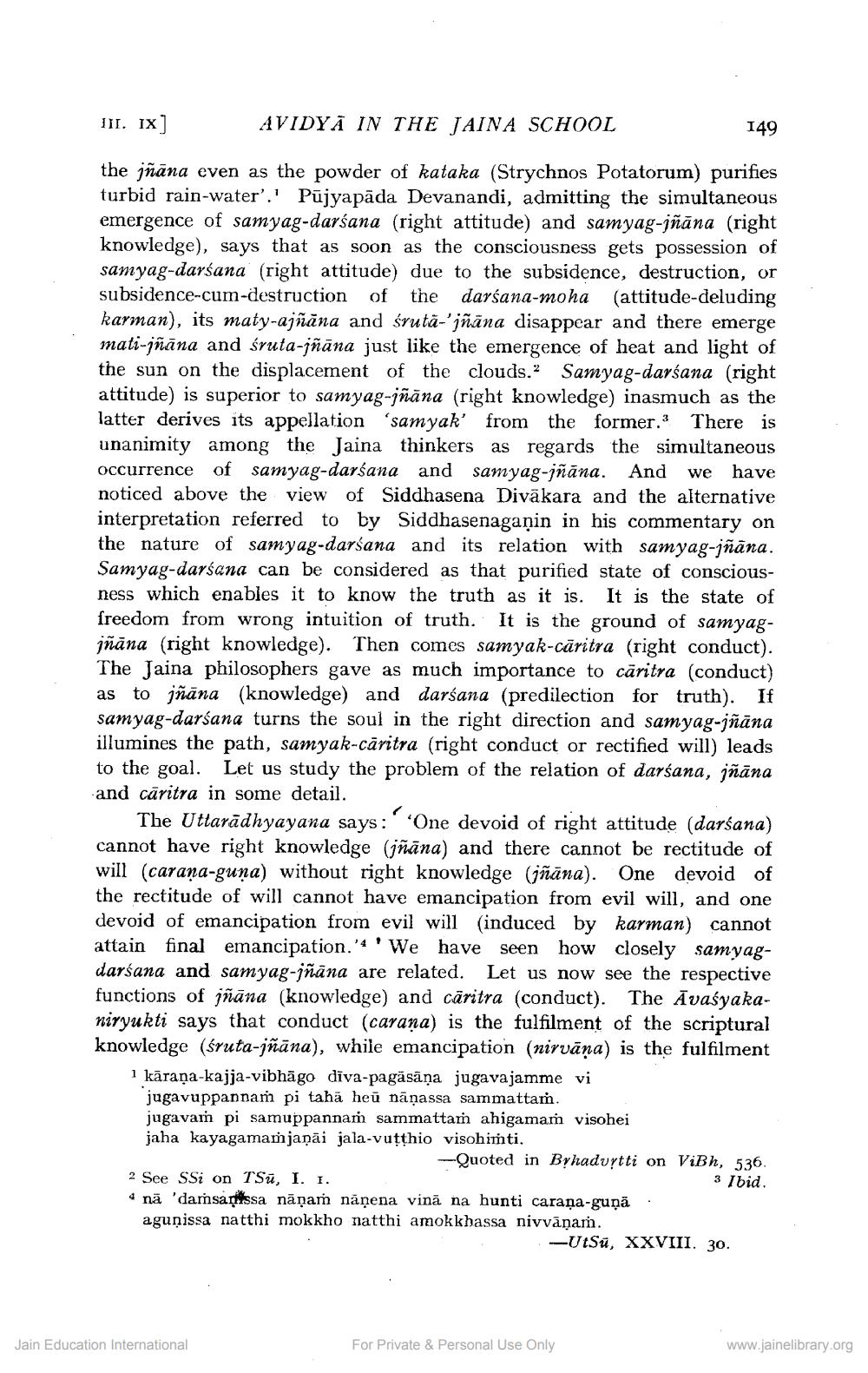________________
III. IX]
AVIDYA IN THE JAINA SCHOOL
149
the jñāna even as the powder of kataka (Strychnos Potatorum) purifies turbid rain-water'.! Pūjyapāda Devanandi, admitting the simultaneous emergence of samyag-darśana (right attitude) and samyag-jñāna (right knowledge), says that as soon as the consciousness gets possession of samyag-darśana (right attitude) due to the subsidence, destruction, or subsidence-cum-destruction of the darśana-moha (attitude-deluding karman), its maty-ajñāna and śruta- jñāna disappear and there emerge mati-jñāna and śruta-jñāna just like the emergence of heat and light of the sun on the displacement of the clouds.2 Samyag-darśana (right attitude) is superior to samyag-jñāna (right knowledge) inasmuch as the latter derives its appellation 'samyak' from the former. There is unanimity among the Jaina thinkers as regards the simultaneous occurrence of samyag-darśana and samyag-jñāna. And we have noticed above the view of Siddhasena Diväkara and the alternative interpretation referred to by Siddhasenaganin in his commentary on the nature of samyag-darśana and its relation with samyag-jñāna. Samyag-darśana can be considered as that purified state of consciousness which enables it to know the truth as it is. It is the state of freedom from wrong intuition of truth. It is the ground of samyagjñāna (right knowledge). Then comes samyak-căritra (right conduct). The Jaina philosophers gave as much importance to cāritra (conduct) as to jñāna (knowledge) and darśana (predilection for truth). If samyag-darśana turns the soul in the right direction and samyag-jñana illumines the path, samyak-caritra (right conduct or rectified will) leads to the goal. Let us study the problem of the relation of darśana, jñāna and caritra in some detail.
The Uttarādhyayana says:' 'One devoid of right attitude (darśana) cannot have right knowledge (jñāna) and there cannot be rectitude of will (carana-guna) without right knowledge (ñāna). One devoid of the rectitude of will cannot have emancipation from evil will, and one devoid of emancipation from evil will (induced by karman) cannot attain final emancipation.': 'We have seen how closely samyagdarśana and samyag-jñāna are related. Let us now see the respective functions of jñāna (knowledge) and caritra (conduct). The Āvaśyakaniryukti says that conduct (carana) is the fulfilment of the scriptural knowledge (śruta-jñāna), while emancipation (nirvāna) is the fulfilment
1 kāraṇa-kajja-vibhāgo dīva-pagāsāņa jugavajamme vi
jugavuppannam pi taha heu nāṇassa sammattam. jugavam pi samuppannam sammattam ahigamam visohei jaha kayagamamjaņāi jala-vuţthio visohimti.
--Quoted in Byhadurtti on Vibh, 536. 2 See SSi on TSu, I. 1.
3 Ibid 4 nädarnsassa nāņam nāņena vina na hunti caraņa-guņā. agunissa natthi mokkho natthi amokkhassa nivvānam.
-Utsu, XXVIII. 30.
Of he do Pectii
Jain Education International
For Private & Personal Use Only
www.jainelibrary.org




